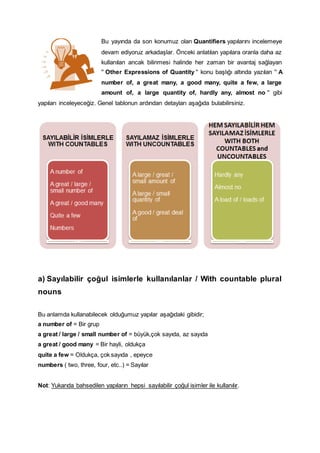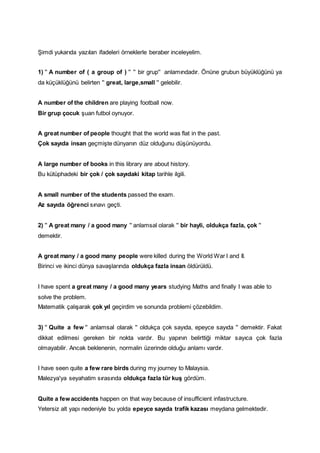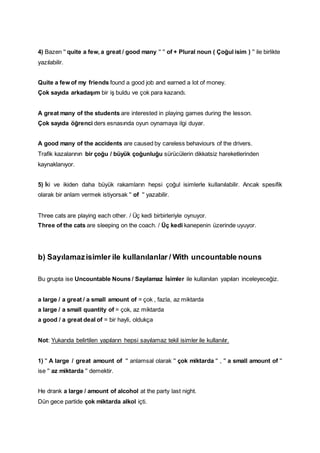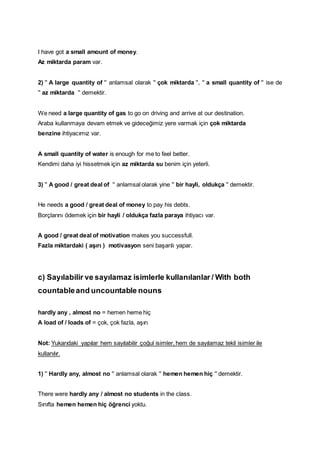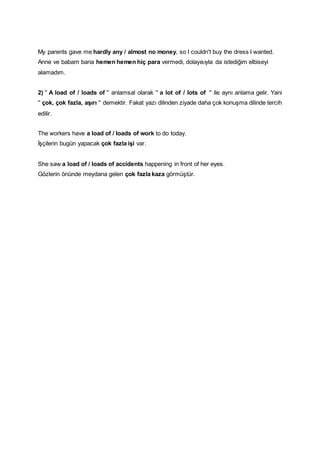Other quantifiers
- 1. Bu yayında da son konumuz olan Quantifiers yapılarını incelemeye devam ediyoruz arkadaşlar. Önceki anlatılan yapılara oranla daha az kullanılan ancak bilinmesi halinde her zaman bir avantaj sağlayan '' Other Expressions of Quantity '' konu başlığı altında yazılan '' A number of, a great many, a good many, quite a few, a large amount of, a large quantity of, hardly any, almost no '' gibi yapıları inceleyeceğiz. Genel tablonun ardından detayları aşağıda bulabilirsiniz. a) Sayılabilir çoğul isimlerle kullanılanlar / With countable plural nouns Bu anlamda kullanabilecek olduğumuz yapılar aşağıdaki gibidir; a number of = Bir grup a great / large / small number of = büyük,çok sayıda, az sayıda a great / good many = Bir hayli, oldukça quite a few = Oldukça, çok sayıda , epeyce numbers ( two, three, four, etc..) = Sayılar Not: Yukarıda bahsedilen yapıların hepsi sayılabilir çoğul isimler ile kullanılır.
- 2. Şimdi yukarıda yazılan ifadeleri örneklerle beraber inceleyelim. 1) '' A number of ( a group of ) '' '' bir grup'' anlamındadır. Önüne grubun büyüklüğünü ya da küçüklüğünü belirten '' great, large,small '' gelebilir. A number of the children are playing football now. Bir grup çocuk şuan futbol oynuyor. A great number of people thought that the world was flat in the past. Çok sayıda insan geçmişte dünyanın düz olduğunu düşünüyordu. A large number of books in this library are about history. Bu kütüphadeki bir çok / çok sayıdaki kitap tarihle ilgili. A small number of the students passed the exam. Az sayıda öğrenci sınavı geçti. 2) '' A great many / a good many '' anlamsal olarak '' bir hayli, oldukça fazla, çok '' demektir. A great many / a good many people were killed during the World War I and II. Birinci ve ikinci dünya savaşlarında oldukça fazla insan öldürüldü. I have spent a great many / a good many years studying Maths and finally I was able to solve the problem. Matematik çalışarak çok yıl geçirdim ve sonunda problemi çözebildim. 3) '' Quite a few '' anlamsal olarak '' oldukça çok sayıda, epeyce sayıda '' demektir. Fakat dikkat edilmesi gereken bir nokta vardır. Bu yapının belirttiği miktar sayıca çok fazla olmayabilir. Ancak beklenenin, normalin üzerinde olduğu anlamı vardır. I have seen quite a few rare birds during my journey to Malaysia. Malezya'ya seyahatim sırasında oldukça fazla tür kuş gördüm. Quite a few accidents happen on that way because of insufficient infastructure. Yetersiz alt yapı nedeniyle bu yolda epeyce sayıda trafik kazası meydana gelmektedir.
- 3. 4) Bazen '' quite a few, a great / good many '' '' of + Plural noun ( Çoğul isim ) '' ile birlikte yazılabilir. Quite a few of my friends found a good job and earned a lot of money. Çok sayıda arkadaşım bir iş buldu ve çok para kazandı. A great many of the students are interested in playing games during the lesson. Çok sayıda öğrenci ders esnasında oyun oynamaya ilgi duyar. A good many of the accidents are caused by careless behaviours of the drivers. Trafik kazalarının bir çoğu / büyük çoğunluğu sürücülerin dikkatsiz hareketlerinden kaynaklanıyor. 5) İki ve ikiden daha büyük rakamların hepsi çoğul isimlerle kullanılabilir. Ancak spesifik olarak bir anlam vermek istiyorsak '' of '' yazabilir. Three cats are playing each other. / Üç kedi birbirleriyle oynuyor. Three of the cats are sleeping on the coach. / Üç kedi kanepenin üzerinde uyuyor. b) Sayılamazisimler ile kullanılanlar / With uncountable nouns Bu grupta ise Uncountable Nouns / Sayılamaz İsimler ile kullanılan yapıları inceleyeceğiz. a large / a great / a small amount of = çok , fazla, az miktarda a large / a small quantity of = çok, az miktarda a good / a great deal of = bir hayli, oldukça Not: Yukarıda belirtilen yapıların hepsi sayılamaz tekil isimler ile kullanılır. 1) '' A large / great amount of '' anlamsal olarak '' çok miktarda '' , '' a small amount of '' ise '' az miktarda '' demektir. He drank a large / amount of alcohol at the party last night. Dün gece partide çok miktarda alkol içti.
- 4. I have got a small amount of money. Az miktarda param var. 2) '' A large quantity of '' anlamsal olarak '' çok miktarda '', '' a small quantity of '' ise de '' az miktarda '' demektir. We need a large quantity of gas to go on driving and arrive at our destination. Araba kullanmaya devam etmek ve gideceğimiz yere varmak için çok miktarda benzine ihtiyacımız var. A small quantity of water is enough for me to feel better. Kendimi daha iyi hissetmek için az miktarda su benim için yeterli. 3) '' A good / great deal of '' anlamsal olarak yine '' bir hayli, oldukça '' demektir. He needs a good / great deal of money to pay his debts. Borçlarını ödemek için bir hayli / oldukça fazla paraya ihtiyacı var. A good / great deal of motivation makes you successfull. Fazla miktardaki ( aşırı ) motivasyon seni başarılı yapar. c) Sayılabilir ve sayılamaz isimlerle kullanılanlar / With both countableand uncountable nouns hardly any , almost no = hemen heme hiç A load of / loads of = çok, çok fazla, aşırı Not: Yukarıdaki yapılar hem sayılabilir çoğul isimler, hem de sayılamaz tekil isimler ile kullanılır. 1) '' Hardly any, almost no '' anlamsal olarak '' hemen hemen hiç '' demektir. There were hardly any / almost no students in the class. Sınıfta hemen hemen hiç öğrenci yoktu.
- 5. My parents gave me hardly any / almost no money, so I couldn't buy the dress I wanted. Anne ve babam bana hemen hemen hiç para vermedi, dolayısıyla da istediğim elbiseyi alamadım. 2) '' A load of / loads of '' anlamsal olarak '' a lot of / lots of '' ile aynı anlama gelir. Yani '' çok, çok fazla, aşırı '' demektir. Fakat yazı dilinden ziyade daha çok konuşma dilinde tercih edilir. The workers have a load of / loads of work to do today. İşçilerin bugün yapacak çok fazla işi var. She saw a load of / loads of accidents happening in front of her eyes. Gözlerin önünde meydana gelen çok fazla kaza görmüştür.

